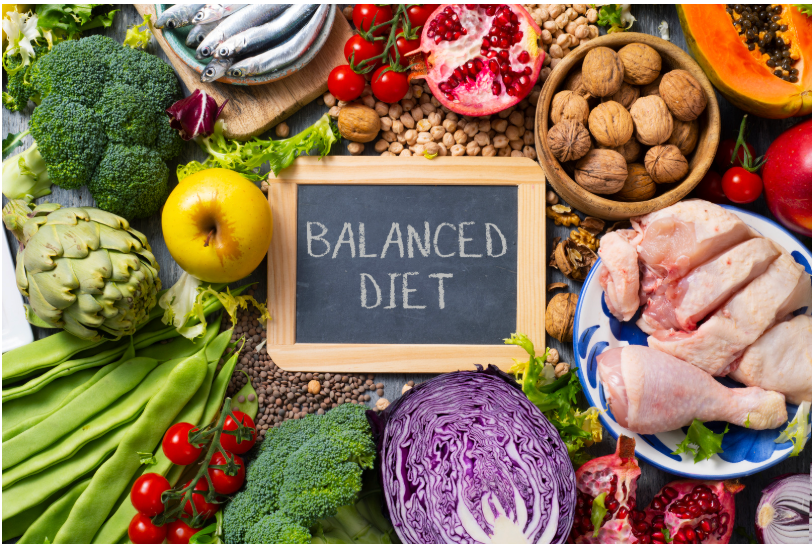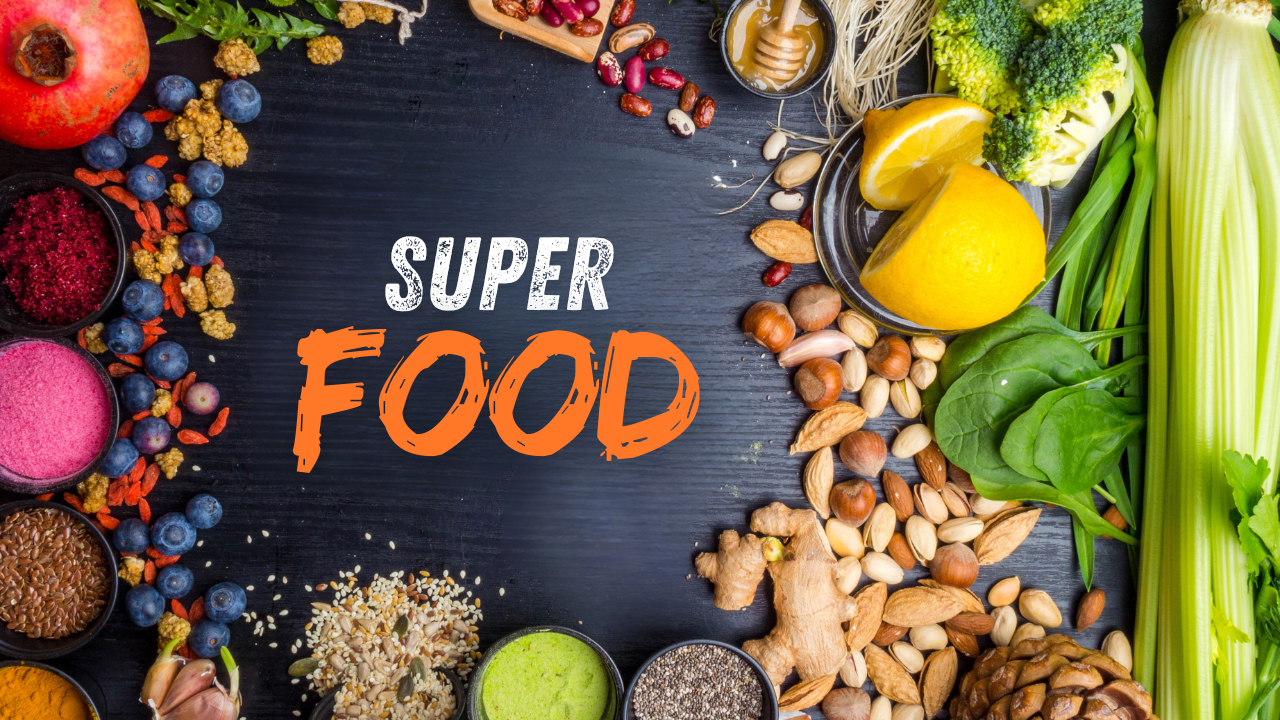SUPER FOOD
Understanding Superfoods: Myths, Benefits, and Essential Nutrients

In the world of wellness and nutrition, “superfood” has become a popular term, but what does it truly mean? Do we genuinely need superfoods in our diets, or is this just another health trend? Let’s unravel the mystery surrounding superfoods, explore their benefits, and understand the importance of essential nutrients for our health.
What Are Superfoods?
Superfoods are foods that are exceptionally rich in nutrients, including vitamins, minerals, and antioxidants, and are believed to provide extraordinary health benefits. While these foods can play a crucial role in maintaining a healthy and vibrant body, it’s important to recognize that a well-rounded diet can also meet your nutritional needs effectively.
A balanced diet consists of a variety of food groups: seeds, grains, pulses, fresh fruits, vegetables, dairy, nuts, dry fruits, ghee, oil, spices, and even non-vegetarian items such as fish and lean meat. Each of these contributes unique nutrients that are essential for the body’s functions, helping regulate chemical processes, provide energy, and support vital systems.
By focusing on diversity in your meals, you ensure your body gets the wide range of nutrients it requires to stay healthy and happy.
Why Are Essential Nutrients Important?
Essential nutrients are the cornerstone of our health, playing a pivotal role in supporting various bodily functions that are crucial for reproduction, growth, and overall well-being. These nutrients are broadly categorized into macronutrients and micronutrients, each serving unique and indispensable functions in the body.
Macronutrients
Macronutrients are required by the body in larger amounts and include:
- Water
- Proteins
- Carbohydrates
- Fats
Micronutrients
Micronutrients, though needed in smaller quantities, are equally vital for maintaining health. They consist of:
- Vitamins
- Minerals
Functions of Nutrients
Understanding the specific roles of each nutrient can help us appreciate their importance in our daily diet:
1. Vitamins
Vitamins are organic compounds that are crucial for various bodily functions. They can be water-soluble (like Vitamin C and B-complex vitamins) or fat-soluble (like Vitamins A, D, E, and K).
- Boost Immunity: Vitamins such as Vitamin C and D strengthen the immune system, helping the body fend off infections.
- Strengthen Teeth and Bones: Vitamins like Vitamin D and calcium work together to maintain strong bones and teeth.
- Support Healthy Blood Counts: Vitamins such as B12 and folic acid are essential for the production of healthy red blood cells.
- Aid in Brain and Central Nervous System (CNS) Functions: B vitamins play a crucial role in maintaining brain health and cognitive functions.
2. Minerals
Minerals are inorganic elements that support a variety of bodily functions. They are divided into major minerals (like calcium, potassium, and magnesium) and trace minerals (like zinc and selenium).
- Maintain Healthy Skin, Hair, and Nails: Minerals like zinc and selenium contribute to the health and growth of skin, hair, and nails.
- Support Bone Health and Blood Clotting: Calcium and magnesium are vital for maintaining strong bones, while potassium and sodium help regulate blood clotting.
- Regulate Blood Pressure and Immune Functions: Potassium helps in maintaining proper blood pressure levels, and minerals like zinc support immune functions.
3. Proteins
Proteins are large, complex molecules that play many critical roles in the body.
- Aid in Growth and Repair: Proteins are essential for the growth and repair of muscles, bones, hair, and skin.
- Form Antibodies and Hormones: Proteins help in the formation of antibodies that fight infections and hormones that regulate various body functions.
- Act as a Fuel Source: In times of energy deficiency, proteins can be broken down to provide energy to the body.
4. Fats
Fats are a concentrated source of energy and are necessary for various bodily functions.
- Provide Energy: Fats supply more than twice the energy per gram compared to carbohydrates and proteins.
- Support Cell Growth: Fats are integral components of cell membranes, aiding in cell growth and maintenance.
- Aid in Brain Functioning: Essential fatty acids are crucial for brain health and cognitive functions.
- Assist in the Absorption of Vitamins and Minerals: Certain vitamins (A, D, E, K) are fat-soluble, meaning they require fats for proper absorption.
5. Carbohydrates
Carbohydrates are the body’s primary source of energy.
- Serve as the Body’s Primary Energy Source: Carbohydrates are broken down into glucose, which is used by the body for energy.
- Support Brain, Digestive, and Immune System Functions: Glucose is the main fuel for the brain, while carbohydrates also aid in proper digestive function and provide energy to the immune system.
6. Water
Water is often overlooked but is the most vital nutrient for survival.
- Supports Physical and Mental Functions: Water is essential for maintaining bodily functions, including temperature regulation and cognitive processes.
- Detoxifies the Body: Water helps in flushing out toxins through urine and sweat.
- Aids in Nutrient Transport and Hydration: Water is crucial for transporting nutrients to cells and maintaining hydration levels.
- Prevents Constipation: Adequate water intake helps prevent digestive issues like constipation.
- Lubricates Joints: Water acts as a lubricant for joints, facilitating smooth movement.
The Importance of a Balanced Diet

In the world of nutrition, the term “superfood” has gained popularity, often hailed as a quick solution to optimal health due to their high nutrient content. However, while superfoods can be an excellent addition to your diet, it is crucial to remember that a truly healthy diet is one that incorporates a variety of food groups, ensuring your body receives all the necessary nutrients it requires.
The Power of Variety
A balanced diet is not about relying on a single source of nutrition but rather about diversifying your food choices. Incorporating a wide range of seeds, grains, pulses, fresh fruits, vegetables, dairy, nuts, dry fruits, ghee, oils, spices, and even non-vegetarian options provides a comprehensive mix of essential nutrients. Each of these food groups contributes unique benefits that, together, promote overall health and vitality.
When you focus on diversity in your meals, you’re helping your body receive the full spectrum of nutrients it needs to function optimally. These nutrients include vitamins, minerals, proteins, fats, and carbohydrates—all of which play crucial roles in supporting various bodily functions.
The Role of Nutrients in Health
Essential nutrients are the building blocks of good health. These nutrients can be divided into two categories: macronutrients and micronutrients.
- Macronutrients, which include carbohydrates, proteins, and fats, are needed in large amounts. They provide the body with energy and are involved in building and repairing tissues, supporting the immune system, and carrying out a variety of vital processes.
- Micronutrients, such as vitamins and minerals, are required in smaller amounts but are just as important for the body’s intricate systems. These nutrients support everything from immune function to bone health and the production of energy.
By consuming a range of foods, you ensure that your body receives both macronutrients and micronutrients, allowing it to function at its best. Each food group plays a different yet complementary role in nourishing the body, so variety truly is key.
Superfoods: A Valuable Supplement, Not a Replacement
While superfoods can enhance your diet by providing concentrated doses of nutrients, they should not be seen as a replacement for a varied, well-rounded diet. For example, foods like quinoa, kale, chia seeds, and berries are rich in antioxidants, fiber, and vitamins, but they cannot offer everything your body needs. If you solely rely on a few so-called superfoods, you may miss out on the broader range of nutrients that a diverse diet provides.
Including a wide array of foods in your meals, rather than just focusing on superfoods, ensures that you have a more balanced intake. It supports your body in regulating chemical processes, providing consistent energy, maintaining vital functions, and fostering both physical and mental well-being.
Making Informed Dietary Choices
Understanding the roles of macronutrients and micronutrients can help you make better dietary choices. When you include a variety of foods in your meals, you’re giving your body everything it needs to thrive. In addition to the health benefits, eating a balanced diet can also help you maintain a healthy weight, reduce the risk of chronic diseases, and improve overall happiness and mental clarity.
In conclusion, while superfoods offer concentrated doses of essential nutrients, the foundation of good health lies in eating a wide range of foods. By focusing on variety and balance, you can ensure that your body receives the full spectrum of nutrients required to maintain optimal health and well-being. So, remember that when it comes to nutrition, variety truly is the spice of life.
Super Grains and Foods: Building Blocks of a Nutritious Diet

When it comes to maintaining a healthy lifestyle, incorporating nutrient-dense foods is key. Certain grains and foods, often termed “superfoods,” stand out for their exceptional health benefits. Let’s explore the nutritional powerhouses that should form the foundation of a balanced and wholesome diet.
Super Grains: The Nutritional Powerhouses
Grains are staples in diets worldwide, but some grains offer superior nutritional profiles, making them indispensable for a healthy diet:
- Barley: A grain rich in protein and fiber, barley boasts antioxidants and a low glycemic index, making it ideal for managing blood sugar and promoting digestion.
- Ragi (Finger Millet): Packed with calcium, iron, and potassium, ragi is a great choice for infants and lactating mothers. Its high nutrient content makes it a powerhouse for bone health.
- Amaranth (Rajgira): This grain is a complete protein source and contains essential amino acids like lysine, which are crucial for body repair and growth.
- Oats: Known for their high beta-glucan fiber content, oats support heart health, regulate cholesterol, and provide long-lasting energy.
- Buckwheat (Kuttu): Naturally gluten-free and high in protein and fiber, buckwheat is excellent for people with dietary restrictions.
- Foxtail Millet (Kangni): Rich in B vitamins, zinc, and magnesium, this grain is beneficial for brain health and diabetes management due to its low glycemic index.
- Jowar (Sorghum) and Bajra (Pearl Millet): These gluten-free grains have anti-inflammatory properties, are high in fiber, and promote digestive health.
Other Superfoods to Enrich Your Diet
In addition to grains, incorporating a variety of nutrient-packed foods can enhance overall health and well-being:
- Moong Dal: A rich source of protein and carbohydrates, moong dal is a versatile ingredient that supports muscle repair and energy production.
- Drumstick (Moringa): Packed with Vitamin B complex and Vitamin C, drumstick leaves and pods boost immunity and overall health.
- Yam: Known for its ability to boost metabolism and address hormonal imbalances, yam is an excellent addition to a balanced diet.
- Sattu (Roasted Gram Flour): High in protein, iron, and calcium, sattu is a traditional superfood that supports energy levels and bone health.
- Jackfruit: Rich in antioxidants, vitamins, and minerals, jackfruit promotes heart health and offers anti-aging benefits. Its seeds are a great source of protein and riboflavin.
- Papaya: Often called the “fruit of angels,” papaya is rich in the enzyme papain, which aids digestion and provides powerful laxative properties.
- Amla (Indian Gooseberry): One of the richest sources of Vitamin C, amla boosts immunity, improves skin health, and supports digestion.
- Peanuts: Offering healthy fats, antioxidants, and stress-relieving serotonin, peanuts are a nutritious snack option.
- Curd: A probiotic-rich food, curd supports gut health and provides essential nutrients like Vitamin B12 and calcium.
- Ghee: This clarified butter is rich in Omega-3 fatty acids, making it a brain- and heart-healthy fat. Ghee also supports joint health and provides energy.
Super grains and nutrient-dense foods are indispensable for building a nutritious and balanced diet. By incorporating these superfoods into your daily meals, you can harness their exceptional health benefits, from boosting immunity and supporting digestion to promoting heart health and energy levels.
Adopting a diet rich in these foods ensures you provide your body with the essential nutrients it needs to thrive
The Green Miracle: Wheatgrass and Alfalfa

Among the vast array of superfoods, two stand out for their remarkable health benefits: wheatgrass and alfalfa. Often referred to as “green blood,” these plants are celebrated for their unparalleled nutrient density and their role in promoting holistic well-being.
Wheatgrass: Nature’s Elixir
Wheatgrass is derived from the young shoots of the wheat plant and is packed with chlorophyll, enzymes, vitamins, and minerals. This superfood acts as a natural detoxifier, helping to cleanse the body and boost energy levels. It supports immune function, improves digestion, and promotes healthy skin.
Alfalfa: A Nutritional Powerhouse
Alfalfa, known as the “father of all foods,” is a nutrient-rich plant loaded with vitamins A, C, E, and K, as well as essential minerals like calcium, magnesium, and potassium. It aids in reducing cholesterol, supports hormonal balance, and promotes bone and joint health.
Together, wheatgrass and alfalfa offer a comprehensive package of nutrients that work in synergy to nourish the body and support its optimal functioning.
Incorporating superfoods like wheatgrass and alfalfa into your diet can significantly enhance your health and well-being. However, the foundation of a healthy lifestyle lies in maintaining an overall balanced diet that includes a variety of nutrient-rich foods. By focusing on dietary diversity, you ensure that your body receives the essential nutrients it needs to thrive and function at its best.







